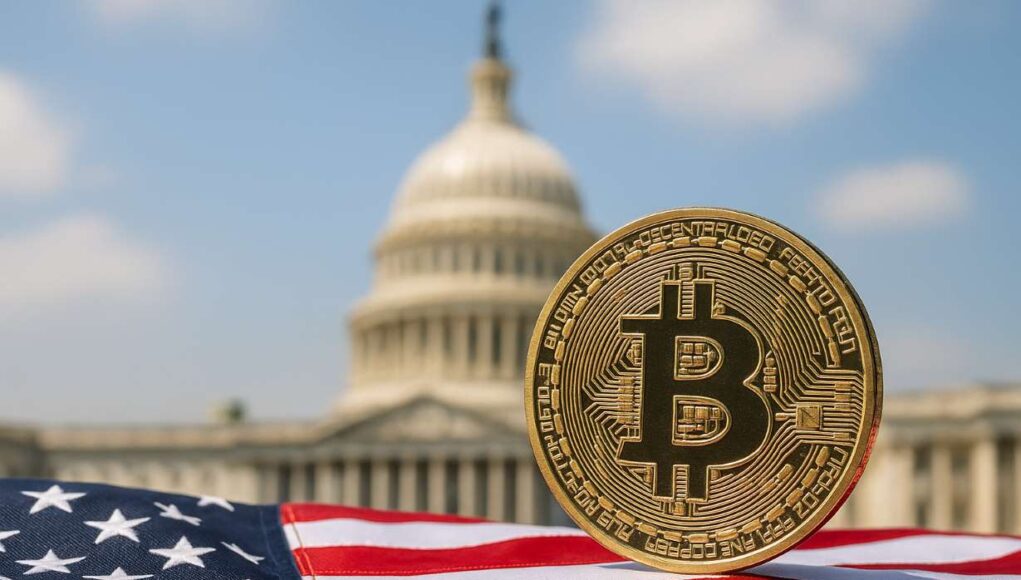The United States is one step closer to establishing a strategic national Bitcoin reserve. In a historic move, the House and Senate have passed the BITCOIN Act. It marks a watershed moment in the government’s formal embrace of digital assets. Meanwhile, the bipartisan GENIUS Act, designed to regulate stablecoins, has hit a wall. Political tensions over Donald Trump’s crypto dealings derail the Senate’s progress on what was once a consensus-driven initiative.
BITCOIN Act Clears Both Chambers
The BITCOIN Act (S.954 / H.R.2032), introduced in March 2025, calls for creating a national Bitcoin reserve managed by the U.S. Treasury. The legislation aims to integrate Bitcoin into the country’s broader financial strategy, treating it as a hedge against inflation and a digital alternative to gold.
Passed with bipartisan support, proponents hailed the Act as a long-overdue step toward modernizing U.S. monetary policy in a rapidly evolving global financial landscape. The bill also mandates periodic disclosures of reserve holdings and outlines guidelines for purchasing and safeguarding the Bitcoin stockpile.
Overview of the BITCOIN Act of 2025
The BITCOIN Act of 2025, formally titled the “Boosting Innovation, Technology, and Competitiveness through Optimized Investment Nationwide Act,” was introduced by Senator Cynthia Lummis (R-WY) and Representative Nick Begich (R-AK) to establish a Strategic Bitcoin Reserve for the United States. This initiative aims to integrate Bitcoin into the nation’s financial strategy, treating it as a strategic asset akin to gold.
Key Provisions
Establishment of a Strategic Bitcoin Reserve
The Act mandates the creation of a Strategic Bitcoin Reserve managed by the U.S. Department of the Treasury. This reserve’s purpose is to serve as a store of value and a hedge against inflation, enhancing national financial resilience.
Acquisition Strategy
The Act directs the Treasury to acquire 200,000 bitcoins annually over five years, aiming for a total of 1 million bitcoins. Acquisitions must be conducted through budget-neutral means, such as utilizing forfeited assets or surplus funds. It may not inflict additional burden on taxpayers.
Minimum Holding Period
The acquired bitcoins are subject to a minimum holding period of 20 years, during which they cannot be sold or transferred. This provision underscores the long-term strategic intent of the reserve.
Transparency and Oversight
To ensure accountability, the Act requires:
- Quarterly public reports detailing the reserve’s holdings and activities.
- Implementation of a Proof of Reserve system with independent audits to verify the existence and security of the assets.
Protection of Individual Rights
A significant provision affirms the right of private individuals and businesses to own, hold, and transact in Bitcoin freely. The federal government is explicitly prohibited from interfering with self-custody rights, reinforcing principles of financial sovereignty.
GENIUS Act Hits a Wall
In stark contrast, the GENIUS Act, which sought to establish regulatory clarity for stablecoin issuance and ensure compliance with anti-money laundering standards, failed to secure the 60 votes required to move forward in the Senate. Despite initial bipartisan enthusiasm, the bill was pulled into partisan controversy after revelations that former President Trump and his associates had deep financial interests in a privately issued stablecoin, reportedly worth billions.
The controversy prompted leading Senate Democrats, including Elizabeth Warren, Mark Kelly, and Jeff Merkley, to introduce the “End Crypto Corruption Act.” The Act seeks to ban elected officials and their families from promoting or profiting from digital asset ventures while in office. The resulting fallout fractured negotiations around the GENIUS Act, delaying stablecoin regulation and potentially jeopardizing industry confidence.
Diverging Paths for Crypto Policy
The divergent outcomes of these two legislative efforts reflect the broader struggle within Washington to craft coherent crypto policy. While Bitcoin’s status as a decentralized and politically neutral asset helped the BITCOIN Act gain traction, stablecoins, often involving corporate issuers and governance models, remain mired in regulatory ambiguity and political baggage.
Industry stakeholders had hoped that 2025 would be the year of regulatory clarity. Now, with one major bill passed and another stalled, the outlook remains murky. As the U.S. moves forward with a national Bitcoin strategy, questions remain about the future of dollar-pegged digital assets that drive much of the crypto economy.
With the BITCOIN Act awaiting presidential signature, attention turns to implementation and potential market impact. Meanwhile, lawmakers behind the GENIUS Act have signaled their intent to revise and reintroduce the bill in the coming months. It remains unclear whether bipartisan alignment can be restored amid rising political tensions.
For now, Bitcoin has gained formal recognition in the halls of Congress. Stablecoins, however, will have to wait their turn.
Readers’ frequently asked questions
Can regular people still buy and hold Bitcoin if the U.S. government is creating a national reserve?
Yes, the creation of a U.S. Bitcoin reserve does not restrict individual ownership in any way. The government acquiring Bitcoin for strategic purposes doesn’t impact your right to buy, hold, or sell Bitcoin through exchanges or wallets. In fact, the BITCOIN Act specifically protects your right to self-custody and use Bitcoin freely within the United States.
Why does the GENIUS Act need 60 votes in the Senate? Isn’t a simple majority enough to pass a bill?
In the U.S. Senate, most legislation requires 60 votes to overcome a filibuster and proceed to a final vote, a process called “cloture.” Even if a bill has majority support, it can be blocked unless 60 senators agree to move it forward. That’s what happened with the GENIUS Act: despite bipartisan talks, it failed to get the 60 votes needed to advance.
Does the BITCOIN Act mean the U.S. will start using Bitcoin for payments or as official currency?
No, the BITCOIN Act does not make Bitcoin legal tender or an official form of payment for taxes or government transactions. The reserve is being created as a store of value, similar to how gold is held. It is not a replacement for the U.S. dollar. The government sees it more as a long-term financial asset than a means of everyday payment.
What Is In It For You? Action Items You Might Want to Consider
Monitor market reactions to the BITCOIN Act’s implementation timeline
With the U.S. poised to begin acquiring Bitcoin for a national reserve, traders should watch for Treasury signals or market activity hinting at purchasing schedules. Accumulation at scale could tighten supply and trigger bullish momentum—getting ahead of that narrative might offer a strategic entry.
Reassess stablecoin exposure in light of regulatory uncertainty
The failure of the GENIUS Act means regulatory clarity for stablecoins remains out of reach for now. Traders should consider diversifying away from stablecoins that may face scrutiny and monitor which issuers remain compliant across jurisdictions. Favor platforms and tokens with transparent audits and strong legal positioning.
Stay alert to political risk as a volatility driver
Partisan divides are clearly influencing crypto policy, and revelations involving high-profile figures like Trump have already disrupted legislation. Traders should factor in U.S. political news as a short-term volatility signal, especially during legislative sessions or campaign periods when crypto becomes a talking point.











[…] >>> Read more: BITCOIN Act Approved, GENIUS Act Hits a Wall […]
[…] >>> Read more: BITCOIN Act Approved, GENIUS Act Hits a Wall […]